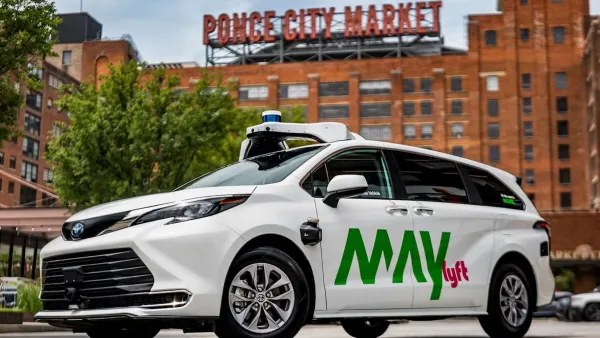An MIT study determined that traffic lights, and their inefficiencies, could be eliminated if all vehicles were equipped to regulate their speed and "batch" together as they approach intersections.

Less a fully autonomous system than an extension of cruise control, the slot-based network could take away the need to wait at traffic lights. "The basic idea is that actors in a system are grouped into batches, and the speed of their movement is carefully controlled to move them more efficiently through a space."
Carlo Ratti and Paolo Santi of MIT have released a study that examines how cars could communicate to navigate intersections without coming to a stop. The system relies on sensors that relay a vehicle's trajectory to a central computer, which can then control that vehicle's speed and group it with other cars before arriving in the intersection.
Essentially, writes Kelsey Campbell-Dollaghan, "What Santi and Ratti are proposing is a super-intelligent piece of software that could take the basic model of a stoplight—cycling between stop and go—and speed it up," so that all vehicles continue through the intersections at slow but steady speeds.
Of course, the article notes, slot-based design has to contend with the same barrier autonomous vehicles face: a human unwillingness to give up control.
FULL STORY: MIT's Not-So-Crazy Plan To Get Rid Of Stoplights

Planetizen Federal Action Tracker
A weekly monitor of how Trump’s orders and actions are impacting planners and planning in America.

Chicago’s Ghost Rails
Just beneath the surface of the modern city lie the remnants of its expansive early 20th-century streetcar system.

Amtrak Cutting Jobs, Funding to High-Speed Rail
The agency plans to cut 10 percent of its workforce and has confirmed it will not fund new high-speed rail projects.

Ohio Forces Data Centers to Prepay for Power
Utilities are calling on states to hold data center operators responsible for new energy demands to prevent leaving consumers on the hook for their bills.

MARTA CEO Steps Down Amid Citizenship Concerns
MARTA’s board announced Thursday that its chief, who is from Canada, is resigning due to questions about his immigration status.

Silicon Valley ‘Bike Superhighway’ Awarded $14M State Grant
A Caltrans grant brings the 10-mile Central Bikeway project connecting Santa Clara and East San Jose closer to fruition.
Urban Design for Planners 1: Software Tools
This six-course series explores essential urban design concepts using open source software and equips planners with the tools they need to participate fully in the urban design process.
Planning for Universal Design
Learn the tools for implementing Universal Design in planning regulations.
Caltrans
City of Fort Worth
Mpact (founded as Rail~Volution)
City of Camden Redevelopment Agency
City of Astoria
City of Portland
City of Laramie





























